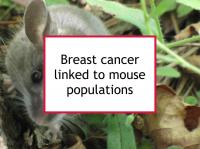Mouse mammary tumor virus (MMTV) is suspected to contribute to breast cancer risk. It is carried by wild mice (i.e., mice living freely, not in the laboratory) and also in some strains of mice bred for breast cancer studies. Now a new study has reported that mouse population outbreaks are associated with spikes in breast cancer incidence.
Mouse mammary tumor virus (MMTV)
MMTV is a retrovirus, in other words, a virus containing ribonucleic acid (RNA) rather than deoxyribonucleic acid (DNA) as its genetic blueprint. MMTV causes mammary tumors to develop in mice spontaneously without exposure to other mammary carcinogens. In fact, generations of mice infected with the virus have been used in breast cancer studies since the virus reliably induces mammary tumors in carriers. Transmission of MMTV to offspring is automatic since it is passed to mouse pups in the breast milk of their mothers and through daily physical contact. MMTV has been found in approximately 40% of U.S. women's breast cancers. It makes sense to avoid exposing our children to mice, including pet mice.
Latest research reports links between BC and mouse populations
The study referenced above was designed to summarize reports concerning mouse populations and breast cancer incidence, as well as to present new data. The authors offered evidence more than 20 years ago that transmission of MMTV from the western European house mouse, Mus musculus domesticus, could account for geographical differences in breast cancer rates. In the present study, the authors show that mouse population outbreaks are correlated with transient increases in breast cancer incidence in Australia and New Zealand. We summarize the Australian findings below.
To conduct the Australian analysis, the authors obtained annual rates of breast cancer in the state of New South Wales, as well as data concerning M. m. domesticus population outbreaks, which are related to wheat production and well documented. There is a delay in increased human MMTV exposure as mice from rural areas invade urban centers. The authors compared outbreaks with breast cancer rates and came to the conclusion that mouse outbreaks contributed a modest increase in breast cancer rates. Furthermore, the increase had a lag time of approximately three years.
The authors suggest in conclusion that a global vaccination campaign similar to that for HPV to eradicate cervical cancer might be warranted for MMTV.
